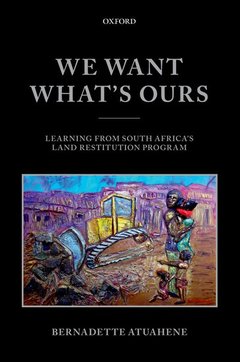We Want What's Ours Learning from South Africa's Land Restitution Program
Langue : Anglais
Auteur : Atuahene Bernadette

Millions of people all over the world have been displaced from their homes and property. Dispossessed individuals and communities often lose more than the physical structures they live in and their material belongings, they are also denied their dignity. These are dignity takings, and land dispossessions occurring in South Africa during colonialism and apartheid are quintessential examples. There have been numerous examples of dignity takings throughout the world, but South Africa stands apart because of its unique remedial efforts. The nation has attempted to move beyond the more common step of providing reparations (compensation for physical losses) to instead facilitating dignity restoration, which is a comprehensive remedy that seeks to restore property while also confronting the underlying dehumanization, infantilization, and political exclusion that enabled the injustice. Dignity restoration is the fusion of reparations with restorative justice. In We Want Whats Ours, Bernadette Atuahenes detailed research and interviews with over one hundred and fifty South Africans who participated in the nations land restitution program provide a snapshot of South Africas successes and failures in achieving dignity restoration. We Want What's Ours is globally relevant because dignity takings have happened all around the world and throughout history: the Nazi confiscation of property from Jews during World War II; the Hutu taking of property from Tutsis during the Rwandan genocide; the widespread commandeering of native peoples property across the globe; and Saddam Husseins seizing of property from the Kurds and others in Iraq are but a few examples. When people are deprived of their property and dignity in years to come, the lessons learned in South Africa can help governments, policy makers, scholars, and international institutions make the transition from reparations to the more robust project of dignity restoration.
Bernadette Atuahene is a Professor of Law at Chicago-Kent College of Law, Illinois Institute of Technology, and a faculty fellow at the American Bar Foundation. She is a graduate of Yale Law School and Harvards Kennedy School of Government. She has done extensive research, writing, speaking, and consulting on land issues. We Want Whats Ours is part of a larger body of work that includes a short documentary film called Sifuna Okwethu, which is about one South African familys fight to regain their land stolen by the apartheid authorities; and a curriculum to accompany the film that encourages students to explore how land injustice in South Africa relates to the many injustices they may have witnessed in their own communities. For more information, go to the book website: wewantwhatsours.com
Date de parution : 01-2016
Ouvrage de 208 p.
15.5x23.3 cm
Date de parution : 06-2014
Ouvrage de 208 p.
16.2x24 cm
Thèmes de We Want What's Ours :
© 2024 LAVOISIER S.A.S.
